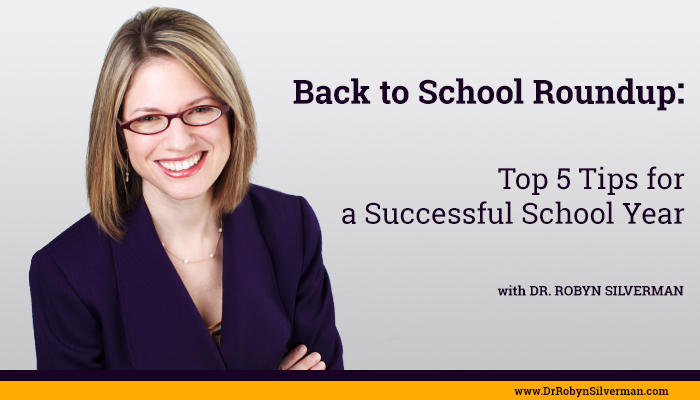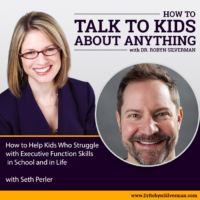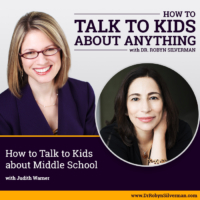Podcast: Play in new window | Download
Subscribe: Apple Podcasts | RSS | More
Back to School Round Up: Top 5 Tips for a Successful School Year
We are celebrating a milestone! Not only is it back-to-school time for the kiddos, we are also celebrating that the How to Talk to Kids about Anything Podcast has been downloaded over 100,000 times! Thank you!! xoxox
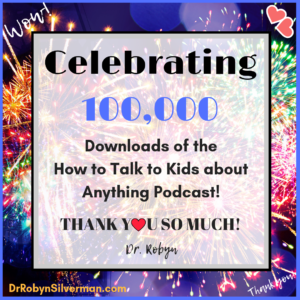 So, before we get into today’s podcast episode, I wanted to share with you all, my amazing, loyal listeners, some very exciting news. I just found out that the How to Talk to Kids about Anything podcast has been downloaded over 100, 000 times. In fact, as of this recording, our 69th episode, it has been downloaded 106, 283 times and it’s because of all of you. All of you and the amazing guests we have had on, learned from and grown from—our own private master class in parenting that we get each week with the top experts and best-selling authors in the field. I can’t believe it half the time. I’m just really excited that you like it too.
So, before we get into today’s podcast episode, I wanted to share with you all, my amazing, loyal listeners, some very exciting news. I just found out that the How to Talk to Kids about Anything podcast has been downloaded over 100, 000 times. In fact, as of this recording, our 69th episode, it has been downloaded 106, 283 times and it’s because of all of you. All of you and the amazing guests we have had on, learned from and grown from—our own private master class in parenting that we get each week with the top experts and best-selling authors in the field. I can’t believe it half the time. I’m just really excited that you like it too.
And for those who have left reviews, wow. They’ve been such bucket-fillers. For example, JCruz2279, thank you for your 5-star review and saying;
“incredibly useful information on communicating with your child, the teachers, coaches, and even other parents with easy to understand and implement strategies. The guests are amazing experts and thought leaders in the industry and the discussions feel like I’m sitting having coffee with some level headed friends. If you have children, work with children or are planning on making children part of your life, I can’t recommend Dr. Robyn and her new podcast strongly enough.”
Well, wow. And thank you for that. A shout out to you, JCruz2279. You made my day. And so have the countless others of you—every single one of your comments and reviews have been read—and they’ve made a big difference. As it turns out, the rating and reviews make THE difference in how my podcast is seen by iTunes and how they position it on the page—so if you would, take a moment and rate and review it, I’d truly appreciate it.
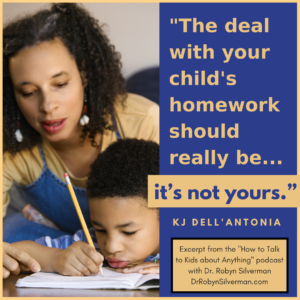 Well, it’s back to school time and it’s the perfect time to gather some of our best tips from our top experts who have provided some insight on what we must know to help our kids have a successful school year. The latest messages I’ve received from parents have been about homework, bullying and mindset so I thought it would be fun, given that this is a milestone podcast episode as we march forward from 100,000 downloads towards 200,000, 500,000 and more, that we take a look back on the best school-related advice we can get from the top experts who can put it all in perspective for us.
Well, it’s back to school time and it’s the perfect time to gather some of our best tips from our top experts who have provided some insight on what we must know to help our kids have a successful school year. The latest messages I’ve received from parents have been about homework, bullying and mindset so I thought it would be fun, given that this is a milestone podcast episode as we march forward from 100,000 downloads towards 200,000, 500,000 and more, that we take a look back on the best school-related advice we can get from the top experts who can put it all in perspective for us.
Dr. Robyn Silverman is a well-known professional speaker, child & teen development specialist and leadership coach who appears regularly as an expert on many national TV such as The Today Show, Nightline and Good Morning America. She is a monthly parenting columnist for US News and World Report and is often quoted in print articles for her hands-on parenting and child development expertise. Known for her positive and accessible solutions to challenging problems, she speaks worldwide to diverse audiences; from company leaders and corporate groups to educators, camp professionals, government offices, children and parents. An award-winning writer and success coach, she has contributed as a child development expert to over for 20 books and is currently writing her second book based on her popular parenting podcast, How to Talk to Kids about Anything. On her podcast, she interviews the top experts in their fields who give all the tips, scripts, stories and steps to make every conversation (even the really tough ones!) easier. From talking to kids about divorce, adoption, anger, stress management and allowance to how to talk about death, sex, porn, screen time or ADHD (and more!), she’s got you covered! Check it out on iTunes of her website. You can find out more about Dr. Robyn at DrRobynSilverman.com, on Facebook at Facebook.com/DrRobynSilverman, on twitter at @DrRobyn or on instagram @DrRobynSilverman.
This podcast provides:
- Top Tips from some of our most beloved guests
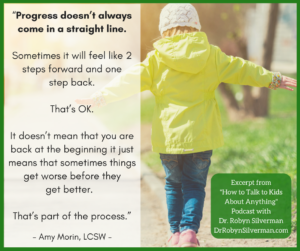
- A discussion of why we don’t want our kids to make mistakes—and why we must allow them to do so with Jessica Lahey
- A reality moment about homework with KJ Dell’Antoia
- Highlighting why we must show our kids how we deal with tough times with Amy Morin
- A conversation about bullying with Rosalind Wiseman, Carrie Goldman and Katie Hurley
- The culmination of empathy and why it’s so important with Dr. Michele Borba and Dr. Dan Siegel
Important Messages:
- Let the kids make mistakes—it’s how they learn and it’s NOT a reflection of your parenting. If we continue to do the work for our
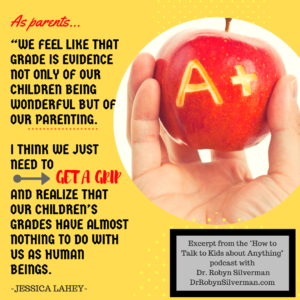 kids, repair the problem, tie up the loose ends, clean up the mess, bring in the forgotten homework, fix the mess-ups—then our kids don’t get the practice of doing these things for themselves.
kids, repair the problem, tie up the loose ends, clean up the mess, bring in the forgotten homework, fix the mess-ups—then our kids don’t get the practice of doing these things for themselves. - Overparenting is dangerous, of course, not just for us as our worth and feeling of success will waiver as our children learn—but also for our kids who either don’t get the chance to learn and grow for themselves—or they receive the message that they must avoid mistakes as they will upset the key adults in their lives.
- Perfectionism can be a hefty price for fall out. It becomes important for us to show children that mistakes are ok- they are part of life—that they can come back from them and cope with them—and they have these skills and gifts to do this.
- When talking about your children, lead with strengths. Their challenges can be discussed after!
- Don’t do your child’s homework for them. This is an extension of number one, of course, but it deserves it’s own tip as it very “back to school” oriented. There is some merit in being around to help your child decipher how to do the homework, when needed, of course. But let’s not confuse ourselves. This does not mean looking over your child’s shoulder and fixing their homework when they make a mistake.
- Ask your child’s teacher how s/he wants you to handle homework and mistakes. Become a team in your children’s learning.
- Mental strength is built by allowing mistakes to happen—allowing our children to pick themselves up, dust themselves off, and try all over again—but they also need to see the key adults in their lives talk through their struggles and how they handle them.
- As adults, we must model how to cope with negative feelings—not by smooshing them down, but by speaking in loud and showing how we deal with our emotions. What are our positive coping skills?
- Talk to your kids about bullying: Bullying is a topic we often discuss during back to school time- as much of social aggression is rooted in the relationships between students in school. Studies tell us that, more and more, bullying can have a lasting effect on a person’s mental health.
- Discuss the differences between conflict, drama and bullying so that everyone is on the same page. Realize that even if it’s not bullying, it can still be painful for your child.
- Your child can recoup some of his or her power with reframing.
- When I’m talking about bullying in my presentations—and I’ve also talked about it on Good Morning America using ABCD—we
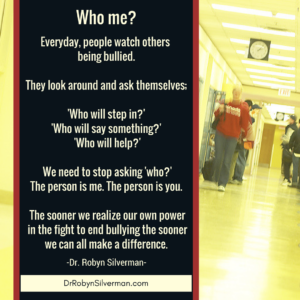 know that it’s bullying when it’s A- aggressive, B- the balance of power is unequal, C it’s consistent and D it’s deliberate.
know that it’s bullying when it’s A- aggressive, B- the balance of power is unequal, C it’s consistent and D it’s deliberate. - When our children talk to us about bullying, instead of reacting and going into “take-over mode”—listen and stay grounded. Be your child’s lighthouse.
- There is strength in numbers- you can always do more than stand by and watch—be an ally or a reporter.
- Our children need to be able to put themselves in the same situation and ask themselves, what would I be feeling? What would I hope someone did for me? Empathy is the key.
- It takes nothing from you to light other people’s candles but it can make the world brighter.
Notable Quotables:
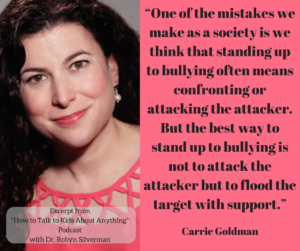 “We don’t get progress reports on our parenting. Lacking that, we tend to look at our kids. We tend to say; if my kid is getting all A’s and my kid is on the traveling soccer league, then I must be doing great as a parent. Not only is that unfair to kids, it’s false. Our kids are not a reflection of us, they are their own people.” ~ Jessica Lahey
“We don’t get progress reports on our parenting. Lacking that, we tend to look at our kids. We tend to say; if my kid is getting all A’s and my kid is on the traveling soccer league, then I must be doing great as a parent. Not only is that unfair to kids, it’s false. Our kids are not a reflection of us, they are their own people.” ~ Jessica Lahey- “The happier parent secret to better homework is not something you do, it’s something you know. Every teacher, principal and administrator I have talked to have said basically the same thing; ‘When we take charge of our kids’ homework, either making sure it gets done or making sure it gets done right or making sure it gets into the backpack, we have defeated the entire purpose.’ The deal with homework should really be, it’s not yours.” ~KJ Dell’Antonia
- “Progress doesn’t always come in a straight line. Sometimes it will feel like 2 steps forward and one step back for yourself and for your child…That’s OK. It doesn’t mean that you are back at the beginning it just means that sometimes things get worse before they get better. That’s part of the process.” ~Amy Morin
- “Conflict is going to happen. People are going to annoy you. People are going to abuse their power. That’s just a fact of life. The goal, for you, is for you to be able to navigate that when you see it so it doesn’t take over. Your job is to learn how to
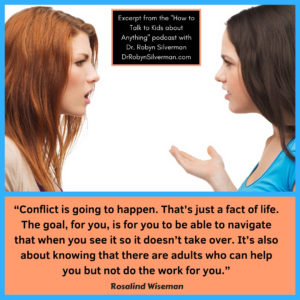 manage it. And it doesn’t happen over night. It’s a process. It’s also about knowing that there are adults who can help you but not do the work for you.” ~Rosalind Wiseman
manage it. And it doesn’t happen over night. It’s a process. It’s also about knowing that there are adults who can help you but not do the work for you.” ~Rosalind Wiseman - Bullying is going after someone for what they are or what they are perceived to be. Drama is a conflict, that’s usually going both ways, and people think it’s entertaining.” ~Rosalind Wiseman
- “There is never a case to be made to be just a bystander. You can always be a witness or an ally.” ~Carrie Goldman
- “One of the mistakes we make as a society is we think that standing up to bullying often means confronting or attacking the attacker. But the best way to stand up to bullying is not to attack the attacker but to flood the target with support.” ~Carrie Goldman
- “If a girl comes home to tell you about relational aggression, slow down your own responses. Be ok with sitting in silence. It’s better to be quiet and think through your responses than to overreact quickly and in the moment. Our girls take their cues from us.” ~Katie Hurley
- “When girls are going through relational aggression, they are in survival mode at school when they’re away from you. You are their lighthouse. They are waiting for that beam of light to wash over them and make them feel better. So, we can’t panic! We have to listen.”
- “Empathy is the key to ending peer cruelty.” ~Dr. Michele Borba
 “How kids are raised makes a huge difference: Model empathy, discuss empathy and give them an opportunity to practice kindness. What you will have is YOU reinforcing the same three things that research says create empathetic children who are going to better the world.” ~Dr. Michele Borba
“How kids are raised makes a huge difference: Model empathy, discuss empathy and give them an opportunity to practice kindness. What you will have is YOU reinforcing the same three things that research says create empathetic children who are going to better the world.” ~Dr. Michele Borba- “It’s as if the culture wants a child to think of himself as a candle and who they are is the wax of the candle. They should have the shiniest wax to distinguish themselves and in middle school or high school or college they will be assessed on the shininess of their wax. Ultimately, you are trying to gain entry to the most elite graveyard. It’s a race to nowhere. And if you see another candle next to you, you want to blow out the flame so you are the only flame left. Then when you apply to a college, they’ll pick you. This gets in the way.” ~Dr. Dan Siegel
- “Think about another way of living where you are not just the wax of the candle but also the light. And your job is to lean over and light other people’s wick. What did it take away from my flame to light someone else’s candle? Nothing. But it made the world a brighter place.” ~Dr. Dan Siegel
Resources:
- How to Talk to Kids about the Gift of Failure with Jessica Lahey
- Homework, Extracurriculars, Over-scheduling and Downtime with KJ Dell’Antonia
- How to Talk to Kids about Mental Strength with Amy Morin, LCSW
- How to Talk to Kids about Boyworld, Girldworld, Bullying and Cultures of Dignity with Rosalind Wiseman
- How to Talk to Kids about Bullying with Carrie Goldman
- How to Talk to Kids about ‘Mean Girl’ Social Aggression with Katie Hurley, LCSW
- How to Talk to Kids about Bully Prevention with Dr. Michele Borba
- How to Parent with Awareness with Dr. Dan Siegel
Books Related To This Episode:
- The Gift of Failure by Jessica Lahey
- How to Be a Happier Parent by KJ Dell’Antonia
- 13 Things Mentally Strong People Don’t Do by Amy Morin
- Queen Bees and Wannabes by Rosalind Wiseman
- Masterminds and Wingmen by Rosalind Wiseman
- Bullied by Carrie Goldman
- No More Mean Girls by Katie Hurley
- End Peer Cruelty, Build Empathy by Dr. Michele Borba
- Unselfie by Dr. Michel Borba
- Aware by Dr. Dan Siegel

